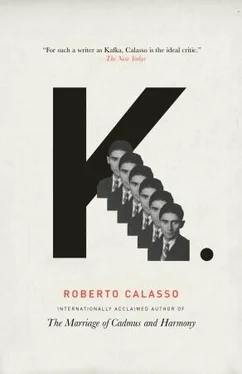Kafka treated paradise in six of the Zürau aphorisms (3, 64, 74, 82, 84, 86). That these are linked to the ones that treat the indestructible is made clear: “If that which must have been destroyed in paradise was destructible, then it wasn’t decisive; but, if it was indestructible, then we’re living in a false belief.” For Kafka, the whole world was “a false belief”—and that was the subject of his writings: the enormous, inexhaustible, tortuous developments of that false belief. Where did they originate? In a fatal misunderstanding regarding the two trees that grow in the center of paradise. Humans are convinced that they were kicked out of that place for eating the fruit of the Tree of the Knowledge of Good and Evil. But this is an illusion. That wasn’t their sin. Their sin lay in not having yet eaten from the Tree of Life. The expulsion from paradise was a pretext to prevent them from doing just that. We are sinful not because we were kicked out of paradise but because our expulsion has rendered us unable to perform one task: to eat from the Tree of Life.
Kafka, who was ill with knowledge, in the end devalued knowledge. In fact, he tells us with hidden sarcasm, “After original sin we have been essentially equal in our capacity to know good and evil.” All the differences we pride ourselves on are of little importance, because “the true differences begin beyond that knowledge.” But what can such a knowledge be, which begins beyond knowledge? Simply the “effort to act in accordance with it.” Here every mental construction comes to ruin, for that capacity simply wasn’t given to us. And in our vain attempt to put knowledge into action, we can only fail. For man that means: to die. Kafka adds, in parentheses: “Perhaps this is also the original meaning of natural death.” Man dies, then, because he “must destroy himself” in his anxiety to act in accord with whatever knowledge he possesses. And meanwhile he overlooks the Tree of Life, whose leafy branches continue rustling, intact. This process, this trial, is in progress at every moment. For Kafka, paradise wasn’t a place where people lived in the past and of which a memory has survived, but rather a perennial, hidden presence. In every moment, an immense, encompassing obstacle prevents us from seeing it. That obstacle is nothing other than the expulsion from paradise — a process Kafka called “eternal in its principal aspect.”
But what might that “principal aspect” be? Only the terrible misunderstanding about knowledge. This is a truth that partakes of the “unconsoling” nature of the good, but it also, we soon realize, implies something that no one any longer would dare to hope: if the expulsion from paradise is an “eternal process”—at least in its “principal aspect”—then that “makes it possible not only that we will be able to remain permanently in paradise, but also that in fact we are permanently there, and it doesn’t matter whether we know it here or not.” Like the indestructible, paradise too may remain hidden. Indeed, in the normal course of life it does. Perhaps only in this way is life possible. Yet we recall that “we were created to live in paradise”—and nowhere does it say that the intended purpose of paradise has been changed. Hence everything that happens does so, “in its principal part,” in paradise, even if during the very moment in which we are being expelled.
Magic was discredited primarily by those who equated it with a kind of creation, and creation was thought to have operated ex nihilo. Doubly naïve. Kafka never wrote about magic, but he had an exact notion of it, so exact that he was able to define it once with sovereign coolness: “It’s entirely conceivable that life’s splendor surrounds us all, and always in its complete fullness, accessible but veiled, beneath the surface, invisible, far away. But there it lies — not hostile, not reluctant, not deaf. If we call it by the right word, by the right name, then it comes. This is the essence of magic, which doesn’t create but calls.” The worship of idols is more than anything an attempt to evoke life’s splendor with names that are, time after time, right. Such a recognition ought to be sufficient to put an end to the atavistic struggle against the gods — a struggle that fails to understand that the singular is one modality of the plural, and the plural one way to catch a flashing glimpse of the veiled splendor.
In his first days in Zürau, Kafka wrote these lines: “O beautiful hour, masterful state, garden gone wild. You turn from the house and see, rushing toward you on the garden path, the goddess of happiness.” A goddess he named only that once.
I would like to express my gratitude to Timothy Rogers, who facilitated my consultation of the Kafka manuscripts housed in the Bodleian Library at Oxford, and to Maddalena Buri, who followed the final stages of this book with a wise and watchful eye.












